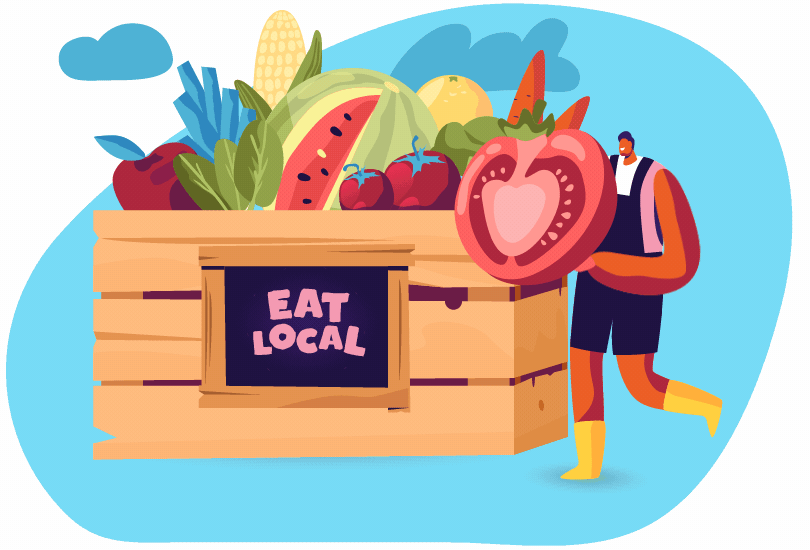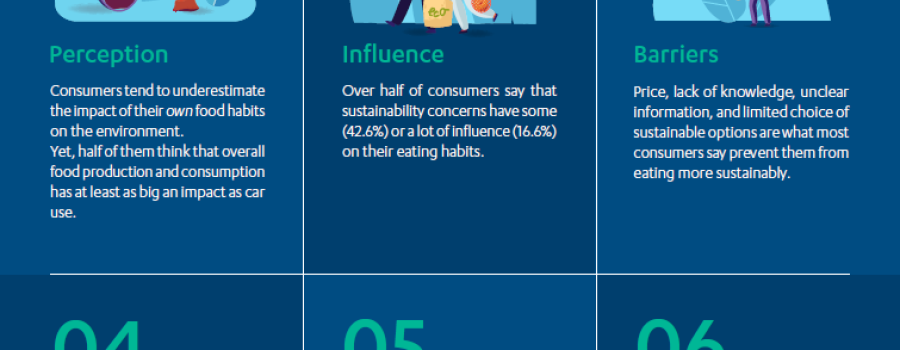The Farm to Fork Strategy: the consumer view
The Farm to Fork Strategy: the consumer view
The Farm to Fork Strategy is the EU's sustainable food blueprint and a major component of the overarching Green Deal, published in December 2019. It comes together with an Action Plan listing 27 measures which pave the way for greener food production, healthier and more sustainable diets, and less food waste. These measures – many still subject to further studies, consultations, and other impact assessments – include notably:
-
A proposal for harmonised mandatory front-of-pack nutrition labelling to enable consumers to make health-conscious food choices (by Q4 2022)
-
A proposal to require origin indication for certain products (by Q4 2022)
-
Nutrient profiles to restrict the use of nutrition and health claims on food that is high in salt, sugar and/or fat (by Q4 2022)
-
Initiatives to stimulate reformulation of processed food, including the setting of maximum levels for certain nutrients (by Q4 2021)
-
A revised EU legislation on Food Contact Materials to improve food safety, ensure consumers’ health and reduce the environmental footprint of the sector (by Q4 2022)
-
A proposal for a sustainable food labelling framework to empower consumers to make sustainable food choices (by 2024).
The EU’s food system is driving environmental degradation and biodiversity loss. It is also failing to secure decent livelihoods for farmers and contributing to unhealthy diets and food waste. There is no doubt that Europeans cannot continue to produce and consume food unsustainably if we are to keep global warming under control.
Through their purchases, consumers can steer food systems towards better outcomes. Over the past years, there has been a perceptible change in European consumers’ habits: red meat consumption is slightly falling while demand for organic food is rising. Yet, this degree of change is nowhere near enough to keep the EU’s food consumption within planetary boundaries.
In cooperation with 12 of its member organisations,1 BEUC carried out a survey among consumers in 11 European countries to better understand their attitudes towards sustainable food and how much they realise the extent to which their food choices impact the environment.
Here are the main takeaways:
-
Perception: Consumers tend to underestimate the impact of their own food habits on the environment, but most are aware of the environmental impact of food habits in general.
-
Willingness to change: Two thirds of consumers are open to changing their eating habits for the environment.
-
Barriers: Price, lack of knowledge, unclear information, and limited choice of sustainable options are what most consumers say prevent them from eating more sustainably.
-
Meat: Just over 40% of consumers say they have either stopped eating red meat or have cut down due to environmental concerns. While consumers have little appetite for insects and lab-grown meat, they better accept plant-based ‘burgers’ and traditional vegetarian food (e.g. pulses) as alternative protein sources.
-
Government role: Only 16% of consumers feel that their government is doing enough to encourage food sustainability at production and consumption levels.
1. Austria (Arbeiterkammer), Belgium (Test Achats/Test Aankoop), Germany (vzbv), Greece (Ekpizo, KEPKA), Italy (Altroconsumo), Lithuania (Lietuvos vartotojų organizacijų aljansas), Netherlands (Consumentenbond), Portugal (DECO), Slovakia (Spoločnosti ochrany spotrebiteľov), Slovenia (Zveza Potrošnikov Slovenije), Spain (OCU). Field work took place in October-November 2019, involving a representative sample of over 11,000 consumers.
The EU ‘Farm to Fork’ Strategy has great potential for making the healthy and sustainable food choice easier for consumers. While we would have hoped for some follow-up actions to happen sooner, at least the Strategy sets the EU on the right track to a more sustainable food and farming system. Here is our take:
At the farm level
-
Consumers expect farmers to be supported and incentivised in the transition towards more sustainable agricultural production. As such, the ‘Farm to Fork’ Strategy’s objectives must be reflected in the post-2020 EU Common Agricultural Policy.
-
Because ‘what gets measured gets done’, BEUC welcomes the quantitative targets set in the Strategy, e.g. for reducing the use of pesticides and antimicrobials in farming. Importantly, these targets must become binding.
-
Organisms obtained from new genomic techniques must continue being regulated as GMOs, incl. pre-market risk assessment and approval. Traceability and labelling of products produced using these techniques must guarantee consumers’ right to know and freedom of choice.
-
The EU must stop importing food and agricultural products that do not meet our standards for environmental protection, animal welfare, etc. The EU’s trade policy, which is currently under review, must be aligned with the ‘Farm to Fork’ Strategy objectives.
Between the farm and the fork
-
Food processors, retailers, caterers, etc. play a major role in shaping and influencing consumer food purchase decision. Rather than a ‘code of conduct’ as suggested in the Strategy, BEUC supports binding rules to restrict the marketing and advertising of unhealthy food to children.
-
We welcome the Commission’s commitment to finally setting ‘nutrient profiles’ to restrict the use of nutrition and health claims on unhealthy food.
-
The announced revision of the EU legislation on food contact materials is a major opportunity to make food packaging safer for consumers.
At the fork level
-
A consumption shift towards more plant-based foods, less red and processed meat, sugars, salt, and fats, will both benefit our health and the environment. Sadly, the Strategy failed to propose much-needed EU-wide guidelines for healthy and sustainable diets to help consumers navigate the shift.
-
The EU must stop funding promotion campaigns for products which Europeans need to consume less for their health and the planet. It is good news that the Strategy ambitions to promote ‘better’ meat, but it must also promote ‘less’ meat (consumption and production).
-
We applaud the Commission for committing to coming forward with a proposal for mandatory, EU-wide front-of-pack nutrition labelling. Evidence from research shows that ‘Nutri-Score’ is currently the nutritional label that works best with consumers.
-
Consumers are eager to see reliable sustainability information on food labels. The framework for sustainable food labelling announced in the Strategy can make it easier for consumers to identify sustainable food options. It must be based on solid, independent, and transparent scientific evidence – including on consumer understanding and use of such labelling system.
-
BEUC fully supports the Strategy’s objective to ensure that “the most sustainable food also becomes the most affordable”. Food prices must be fair to protect people and the planet, and they must send the right signal to consumers to foster behaviour change. At the same time, it is vital to ensure that all consumers can afford a healthy and sustainable diet.


On the Farm to Fork Strategy itself:
- 10 priorities for the Farm to Fork INI report, April 2021
- Position on the strategy, June 2020
- Press release ‘Farm to Fork’: EU makes welcome strides towards greener and healthier food, May 2020
- Blog: Will the EU’s ambition towards a sustainable food system make it to the finish line?, 12 May 2020
- Joint letter with European civil society organisations to EU Commission First Executive Vice President Frans Timmermans, Dec 2019
On sustainable food:
- Report 'One bite at a time', June 2020
- Executive summary and main recommendations
- Consumers and the transition to sustainable food: 10 takeaways
- Press release 'Most EU consumers open to eat more sustainably but face hurdles, new survey shows'
On nutrition labelling:
- Position on Front-of-pack Nutrition Labelling, May 2019
- Nutri-Score factsheet, Sept 2019
- Five Nutri-Score myths busted, Dec 2019
- Blog: 'Nutri-Score now: the time to tackle the obesity crisis is well overdue', May 2018
- Health and nutrition claims factsheet
- Press release ‘EU Commission misses deadline by 10 years to tackle misleading use of food claims’, Jan 2019
On food contact material:
- Factsheet, October 2020.
- Position ‘Time is ripe to repackage food safely’, 2019
On trade:
The European Consumer Organisation
Europäischer Verbraucherverband
Bureau Européen des Unions de Consommateurs




